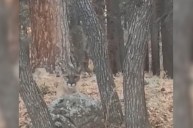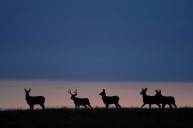Organizers behind an effort to ban mountain lion hunting in Colorado say they've delivered enough signatures to get the issue on the ballot for the November election. According to Wednesday's announcement, the state group Cats Aren't Trophies delivered 188,000 voter signatures — nearly 64,000 more than what's required — supporting the ballot initiative to the Secretary of State.
"Today we submit signatures to give Colorado voters an opportunity to stop the inhumane, unsporting killing of mountain lions and bobcats for their heads and their beautiful coats," said Samantha Miller, a campaign manager for the group. According to the announcement, the measure gained support from more than 100 animal and wildlife groups. They also enlisted the help of more than 900 volunteers to gather the signatures.
The ballot filed with the state would limit the season for hunting mountain lions, bobcats, and lynx to two weeks a year and always at the end of December. The current season lasts four months between November and March. The measure would also prohibit the use of trapping, baiting, dogs, and electronic devices during the hunts.
The 'problem' with mountain lion hunting
In a statement, Miller described most mountain lion hunts as "commercial killing," arguing that hunters pay guides thousands of dollars to guarantee a trophy. Her group described such hunts as less than sportsman-like as guides use packs of dogs to flush out cougars.
Additionally, they argued that nearly half of the 500 or so mountain lions killed each year are female, so their deaths leave lion kittens vulnerable. What's more, the organization argued that opposition groups will auction mountain lion hunts to raise money rather than management.
In press material, opposition groups like the Colorado Trappers & Predator Hunters Association argued that the anti-hunting effort is based on "the emotional whims of animal rights activists" rather than scientific fact. They point to management plans by the Colorado Parks & Wildlife agency, which credits hunting to help support conservation efforts.
On the agency's website, the plan says: "There is no evidence of managed hunting leading to the extinction of any species in Colorado, or of well-regulated hunting negatively affecting the population stability of the state's mountain lions.
However, the agency also makes clear that it "takes no position for or against proposed initiatives" and "will diligently implement all laws duly passed by the legislature and the Governor or by the voters."




